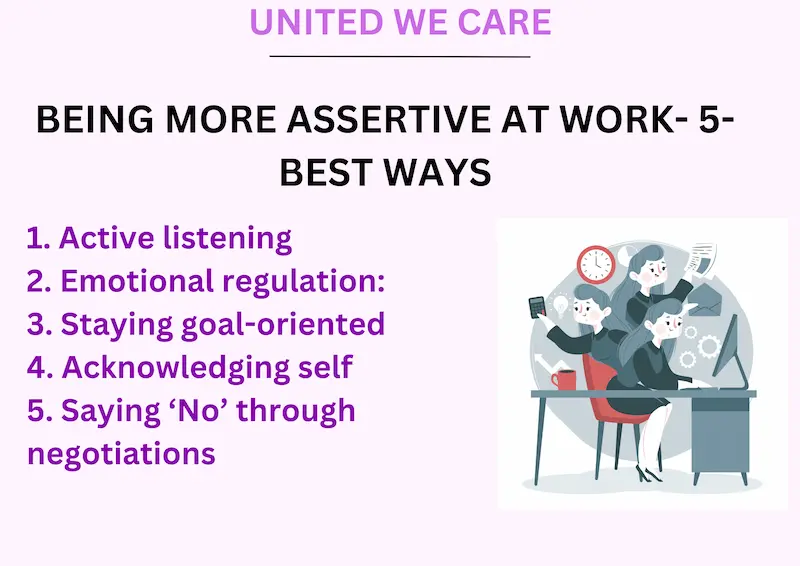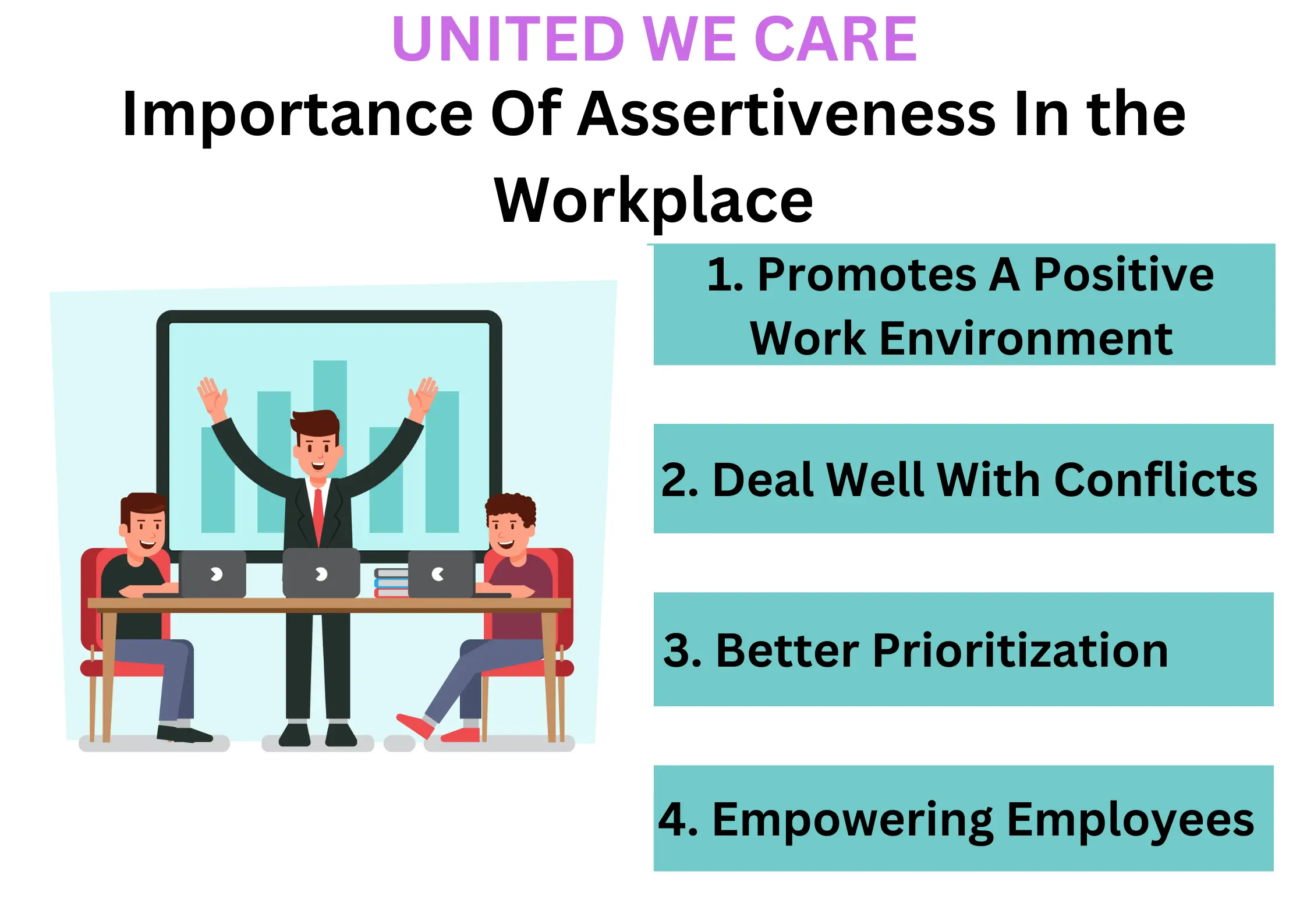Introduction
Irrespective of one’s work role, being a part of any workplace comes with a pre-requisite of communicating with people around the clock. To excel in any workplace, strong communication skills are vital. Effective communication within any professional workplace needs to encompass a certain skill set. Assertiveness is one of the most essential skills.
Assertiveness In Workplace
At one end, people can often feel anxious or doubtful of their opinions or decisions before expressing them to their colleagues. They can also find it difficult to say ‘no’ at work for tasks or activities in which they don’t wish to engage. Such instances are observed mainly due to the fear of being judged, having low self-esteem, or being unable to speak up for oneself. On the other hand, some people act aggressively, putting down others’ opinions and feelings (Omura et al., 2017). Effective collaboration at work doesn’t involve either extreme. Assertiveness in workplaces is an adaptive style of effective communication that helps one to express one’s needs, feelings, and opinions while respecting others’ opinions and feelings.
Being More Assertive At Work- 5-Best Ways

One can gradually develop assertiveness at work through individual efforts. Here are 5 ways to be assertive at the workplace.
- Active listening: Practicing active listening can help one to consider other’s feelings and opinions before directly expressing their own. This can help build a middle ground to work mutually.
- Emotional regulation: Understanding both your own and others’ emotions helps you respond assertively while considering everyone’s feelings. It can aid in responding assertively while taking into account the emotions of both parties.
- Staying goal-oriented: Being mindful and concentrating on achievable goals enhances communication and collaboration in the workplace.
- Acknowledging self: Recognizing your own needs and feelings prevents you from undermining yourself while working with colleagues towards a common goal.
- Saying ‘No’ through negotiations: Focusing on identifying common grounds to reach goals can be helpful. It can also provide a chase for assertive decline to activities that do not align with one’s priorities.
Assertiveness In Workplace Training
Introducing assertiveness as a part of workplace training can play a vital role in increasing teamwork efficiency. Helping colleagues create an environment to express their opinions and indulge in shared decision-making can reduce the instances of shifting blame during conflicts. Indulging team members in role plays and helping them rephrase their conversations can help build assertive communication. Highlighting the importance of body language in assertiveness can serve as a vital component in workplace training. Being mindful about maintaining calm, with steady voice and eye contact, can help colleagues communicate better.
An important aspect of training can be cultivating adaptive emotional mood regulation. Learning strategies to reflect one’s own and other’s emotions and carrying out conversations and actions accordingly can be helpful. Gradually adapting such exercises in daily life and conversations at the workplace can also help to build collaborative workplace relationships (Millacci, 2017).
Importance Of Assertiveness In the Workplace

- Promotes a positive work environment: Practicing assertiveness at the workplace plays an important role in promoting a positive work environment. It ensures that communication amongst colleagues is carried out respectfully and honestly, which further increases the efficiency of the collaborative work.
- Deal well with conflicts: Amidst collaborating with people with different working styles, and meeting multiple work goals, conflicts are bound to happen. Practicing assertiveness can aid in taking a solution-focused approach to conflicts and challenges in the workplace (Butt & Zahid, 2015).
- Better prioritization: Working towards multiple goals in a team often requires prioritization of not just work targets but one’s capacity to meet targets realistically as well. Expressing one’s limits regarding the possible workload that can be handled at a time along with maintaining a balance with their personal space can prevent overextension.
- Empowering employees: Encouraging assertiveness at the workplace can help the employees feel empowered to express themselves openly, which increases mutual respect and efficiency of overall work productivity (Millacci, 2017).
Assertive Communication In The Workplace
- Mutual decision-making: Assertive communication in the workplace can aid the process of addressing conflicts constructively and deciding mutually on effective solutions. Assertive communication can aid the process of negotiations within a team. It further helps to work towards conflict resolution by mutually taking into account the ideas of all team members (Butt & Zahid, 2015).
- Preventing aggressive behavior: Conflicts are bound to happen when people of different perceptions and feelings work towards a common target. Assertive communication can prevent individuals to either be completely passive or aggressive while expressing themselves.
- Constructive feedback: An important aspect of assertive communication in the workplace is constructive feedback. Receiving feedback regarding one’s performance and behavior can promote self-awareness. It can help one utilize their strengths to improve performance not just on an individual level but together at the team/ organizational level. Encouraging a give-and-take of constructive feedback can also enhance mutual understanding and help build better workplace relationships.
Conclusion
Fostering assertiveness at the workplace comes with persistent and long-term benefits resulting in not only the growth of the individuals at their workplaces but the overall growth and success of the organization. Practicing assertiveness at an individual level can make one feel much more confident and open while expressing their thoughts and emotions in front of their colleagues. It can encourage them to take their stand and mutually invest their efforts towards work goals. Assertive communication can ensure that a sense of clarity and control is maintained amongst all the colleagues. It can help foster effective collaboration on an organizational level. Cultivating assertiveness in the workplace among employees can make them feel valued and respected. It can help promote acceptance of diversity and equity among employees and hence achieve collective work goals effectively and efficiently.
References
Butt, A., & Zahid, Z. M. (2015). Effect of assertiveness skills on Job Burnout. International Letters of Social and Humanistic Sciences, 63, 218–224. https://doi.org/10.18052/www.scipress.com/ilshs.63.218
Millacci, T. S. (2017, October 3). Assertiveness in the Workplace: A Quick Guide. poitivepsychology.com. https://positivepsychology.com/assertiveness/
Omura, M., Maguire, J., Levett-Jones, T., & Stone, T. E. (2017). The effectiveness of assertiveness communication training programs for healthcare professionals and students: A systematic review. International Journal of Nursing Studies, 76, 120–128. https://doi.org/10.1016/j.ijnurstu.2017.09.001









